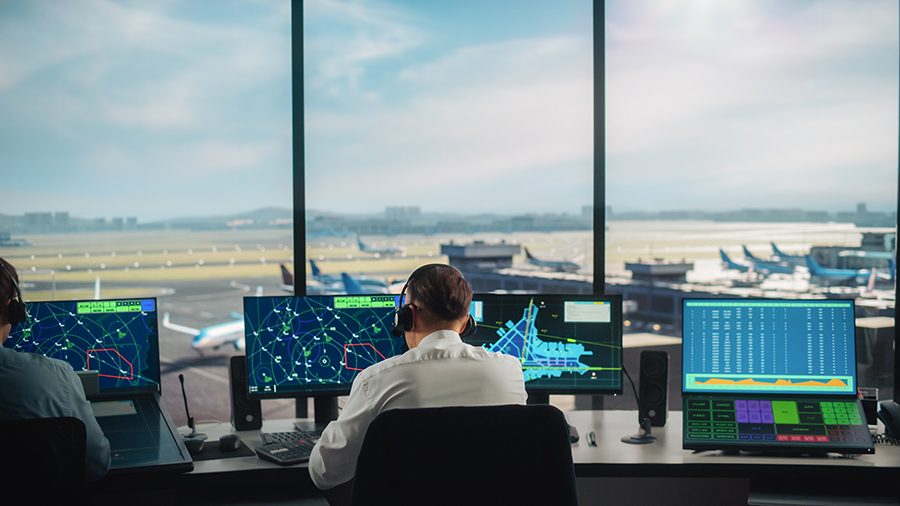-
Key Takeaways
-
What Is Ground School?
- The Main Subjects Include
-
Is Ground School Required for Private Pilots?
-
Types of Ground School (Online, In-Person, and Self-Study)
- Online Ground School
- Pros
- Cons
- In-Person Classes
- Pros
- Cons
- Self-Study
- Pros
- Cons
- Which Option Should You Choose
-
When Should I Start Ground School?
-
Costs and Duration of Ground School
- Online Courses
- In-Person Classes
- Self-Study Materials
- Factors That Can Affect Ground Training
-
Conclusion
Do you want to know about becoming a pilot? Are you curious about what studying for it would be like?
This guide is here to help answer these questions!
If you’re aiming to earn your private pilot’s license, ground school is an essential part of your path to the cockpit. But is it required?
We’ll explain what ground school covers, whether you need it for your license, and the best ways to tackle it.
So, if you’re ready to understand how ground school fits into your training, let’s begin!
Key Takeaways
- Ground school isn’t legally required, but passing the FAA knowledge test is mandatory for private pilots.
- Students can choose between online courses, in-person classes, or self-study methods.
- Most online ground school programs take 2 to 3 months to complete and cost between $200 to $400.
- Starting ground school before flight training can make earning your license easier.
What Is Ground School?
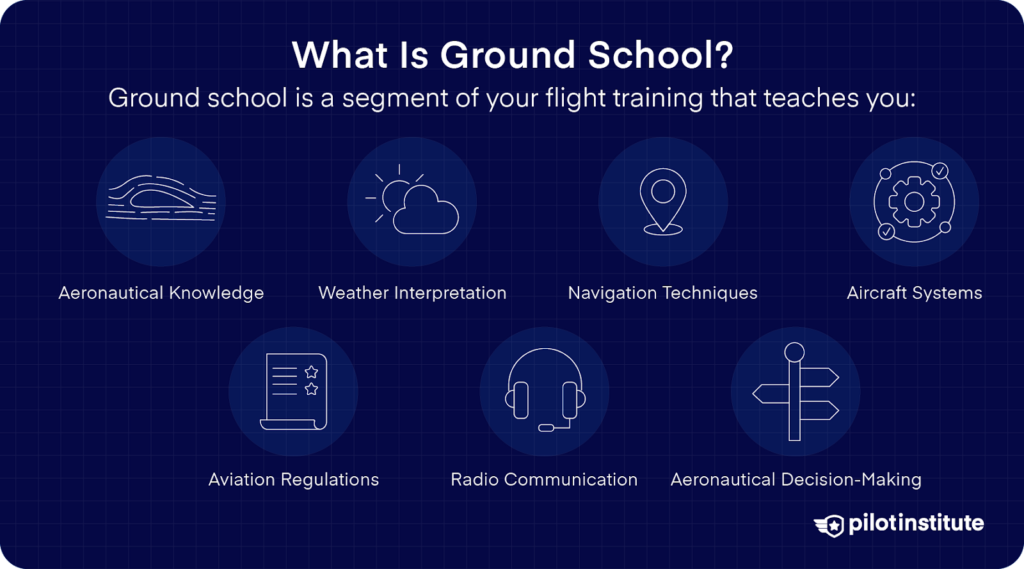
Ever wondered what ground school is? If you’re dreaming of becoming a pilot, you’ve probably heard this term before. Ground school is the basic starting point of your pilot training journey.
It acts as the classroom segment of flight training, where you acquire the required knowledge before taking an aircraft’s controls. This important phase helps you grasp the “why” behind the “how” of flying.
In ground school, you will learn key concepts every pilot must master. The curriculum includes everything from the fundamentals of aerodynamics to navigation. You will learn about weather reports, Federal Aviation Regulations (FARs), and good decision-making.
The Main Subjects Include
- Aeronautical knowledge and flight planning.
- Weather theory and interpretation.
- Navigation techniques and instruments.
- Aircraft systems and performance.
- Aviation regulations and procedures.
- Radio communications.
- Aeronautical decision-making.
Understanding these subjects isn’t just about acing your Private Pilot Knowledge Test. It’s about building a strong foundation for your flying career. The more you understand these basics, the more confident you’ll feel in the cockpit when making real-world decisions.
Is Ground School Required for Private Pilots?
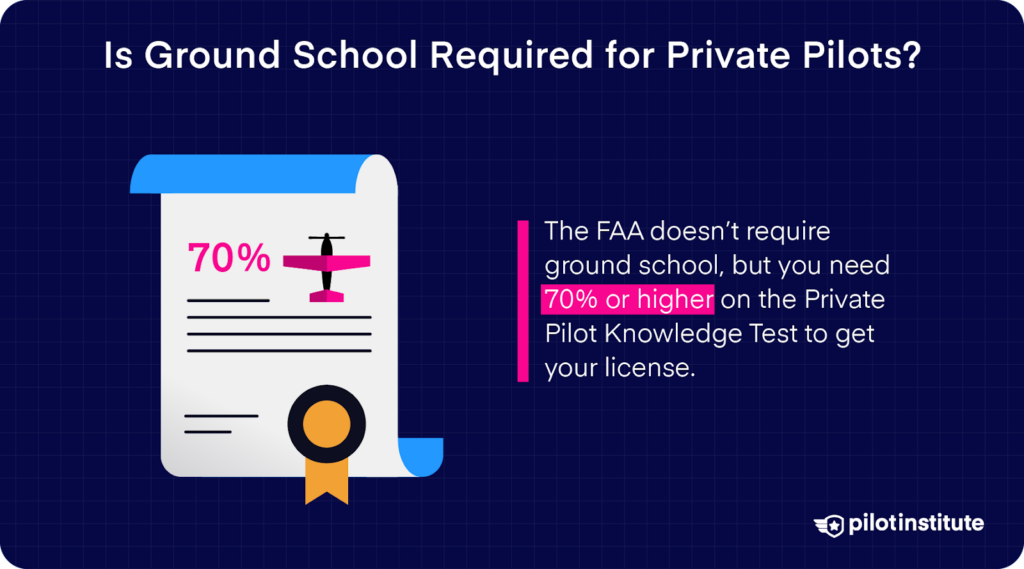
Here’s the straightforward answer: The FAA doesn’t require that you attend ground school. However, you must score 70% or higher on the Private Pilot Knowledge Test to obtain your private pilot license.
You also need to be signed off by a flight instructor in order to take the knowledge exam, and they won’t sign you off without being sure that you’re ready.
While attending structured classes isn’t mandated, many successful pilots opt for some type of ground school.
The knowledge test includes complex topics that can be tough to grasp through self-study alone.
It’s similar to learning chess; you can read about it, but having an experienced instructor to help you with strategies and common mistakes can significantly speed up your learning process.
So, don’t let ground school intimidate you. Many pilots have been exactly where you are now, and they’ve all made it through.
The knowledge test features 65 multiple-choice questions (only 60 are scored) covering various topics. Most flight schools suggest completing ground school before taking the test so that you understand the material and increase your chances of passing.
Types of Ground School (Online, In-Person, and Self-Study)
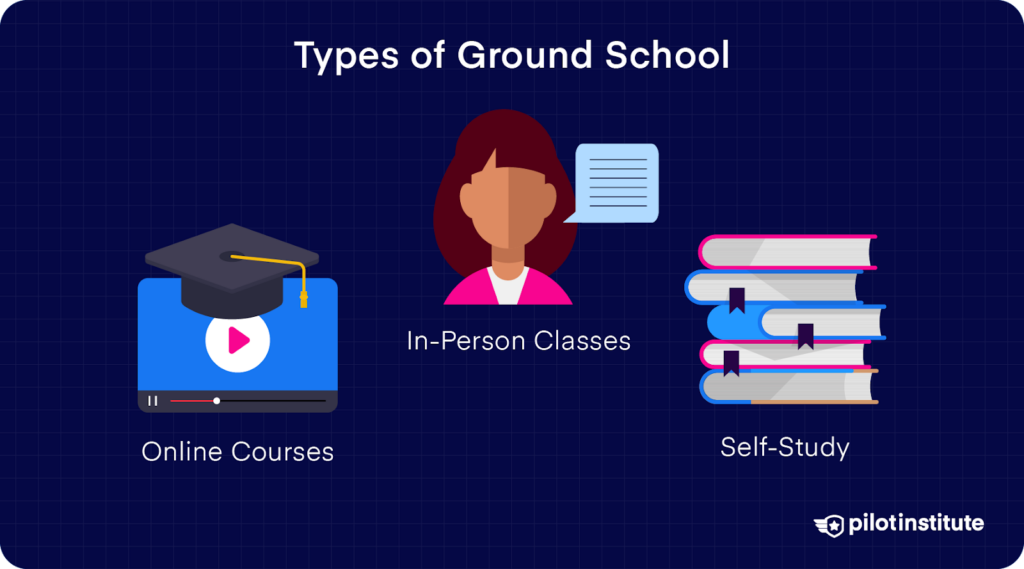
As an aspiring pilot, you have three primary options for ground school training. Each approach comes with its own set of challenges. So, choosing the path that works with your learning style, schedule, and budget is important.
Let’s take a closer look at each type.
Online Ground School
Online ground school has become increasingly popular recently. These programs offer flexibility and a wide range of content at a more affordable price compared to traditional classroom settings.
Many modern online courses feature interactive tools, video demonstrations, and practice tests that mimic the actual FAA knowledge exam environment.
Pros
-
Study at your own pace.
-
Access lessons 24/7.
-
More affordable than in-person options.
-
Regular updates to content.
-
Interactive learning tools and practice tests.
Cons
-
Limited direct interaction with instructors.
-
Requires self-discipline.
-
Potentially miss out on peer discussions.
-
Technical issues can disrupt learning.
In-Person Classes
Traditional classroom ground school is a better choice for students who thrive in structured learning environments.
Instructors can tailor their teaching methods to meet your needs and provide immediate clarification on topics you find difficult to understand.
Pros
-
Direct guidance from instructors.
-
Immediate answers to questions.
-
Structured learning environment.
-
Opportunities to network with other students.
-
Hands-on demonstrations with training aids.
Cons
-
Fixed schedule.
-
Higher costs compared to online options.
-
Limited to local availability.
-
Travel time and expenses.
Self-Study
Self-study requires a high level of self-discipline and motivation. This method is particularly effective for experienced learners who have already honed their study habits and time management skills.
Achieving success in self-study involves utilizing reliable study resources, such as FAA materials and aviation textbooks.
Pros
-
Cheapest option.
-
Lowest cost approach.
-
Study at your own pace.
-
Select your preferred materials.
Cons
-
No instructor guidance.
-
Requires strong self-motivation.
-
Risk of missing important concepts.
-
No feedback.
-
Challenges in tracking progress.
Which Option Should You Choose
The best aspect of modern ground training is that you’re not locked into a single option. Many students find that combining methods works best.
For instance, enrolling in an online ground school program while attending occasional in-person study groups provides more flexibility and personal instruction when needed.
Alternatively, you can sign up for an in-person intensive cram course that packs a lot of information into 8 to 10 hours of straight learning. At the end of the day, you should select a ground school option that works best for you.
When Should I Start Ground School?
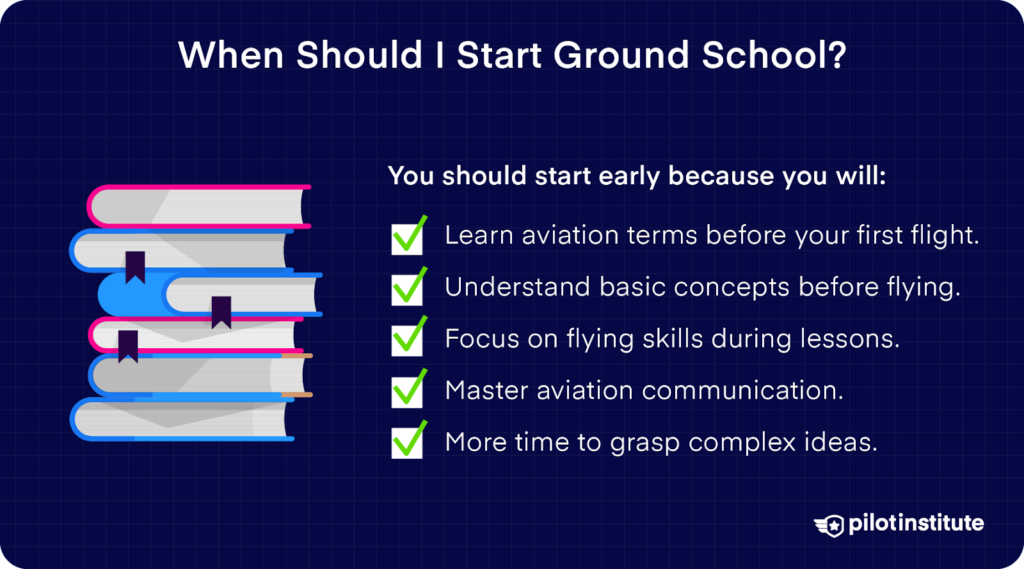
Deciding when to start your ground school depends on your schedule and learning style. So, when’s the best time to start your ground school journey?
Many successful pilots begin ground school before their first flight lesson. This strategy helps build a strong understanding of aviation concepts before hands-on training.
Starting early comes with several benefits:
- You’ll be familiar with aviation terminology before your first flight.
- Basic concepts will be clearer when you encounter them in the air.
- You can concentrate on developing your flying skills during lessons.
- Master aviation communication and lingo.
- More time to understand complex ideas.
If you decide to start ground school at the same time as your flight training, you should try to coordinate your ground lessons with your flying activities. For example, study how to read weather charts and create a flight plan before your cross-country flights.
Costs and Duration of Ground School
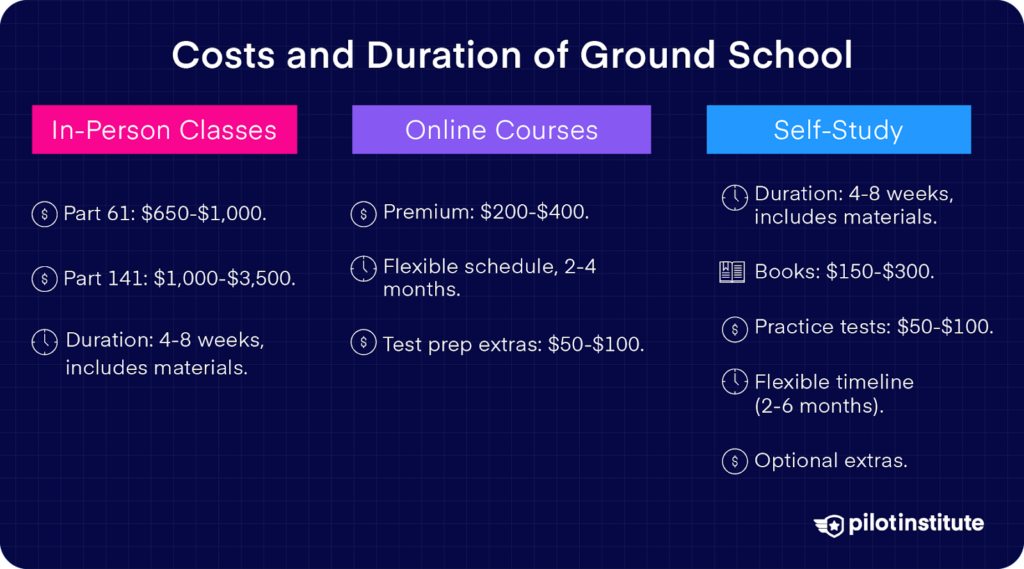
Investing in quality ground training can save you money in the long run. A solid understanding of theory can reduce the number of flight hours needed to learn certain concepts, potentially saving you thousands in aircraft rental and instructor fees.
Ground school costs can vary widely depending on your chosen method and location. Here’s a detailed breakdown:
Online Courses
- Premium packages: $200-$400.
- Study on your own schedule.
- Duration: 2 to 4 months.
- Additional costs for test prep materials: $50-$100.
In-Person Classes
- Part 61 schools: $650-$1,000.
- Part 141 schools: $1,000-$3,500.
- Duration: 4 to 8 weeks.
- Materials are often included in the cost.
Self-Study Materials
- Books and supplies: $150-$300.
- Practice test cost: $50-$100.
- Duration: Varies (typically 2 to 6 months).
- Additional costs for supplementary materials.
Factors That Can Affect Ground Training
Several factors can affect the duration of your ground training. The number of hours you can study each week can help accelerate the course. Your learning style and pace will also influence how quickly you move through the material.
The type of program you select can also impact the timeline, as your personal work and life responsibilities often dictate how much time you can allocate to studying. Lastly, the availability of instructors or study groups can speed up or hamper your training.
Note: Ground school is the first step toward your aviation dreams, so take your time, stay curious, and enjoy building knowledge.
Conclusion
Do you feel ready to start your path toward the skies? Ground school might not be mandatory for everyone, but it’s definitely worth your time if you want a strong foundation in aviation.
You can choose between an online ground school program, classroom setting, or self-study. No matter which path you pick, completing ground school means you’ll be equipped with the knowledge to take on the FAA written test and, most importantly, fly an airplane.
So, if you’re excited to take the first step in becoming a pilot, dive into your options. Pick a path that suits your learning style, and prepare to make your dream of flying a reality!


